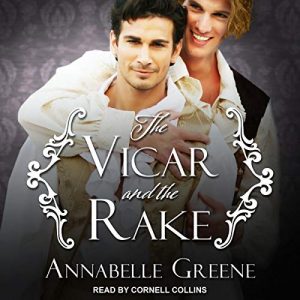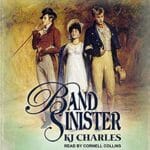Narrated by Cornell Collins
I’m always on the lookout for new m/m historicals, and Carina Press, who published the print edition of début author Annabelle Greene’s The Vicar and the Rake, has a pretty good track record when it comes to LGBTQ+ romance. When I saw that Cornell Collins would be narrating this title, I decided to listen rather than read which, in one way was a good decision, because his polished, accomplished narration was absolutely the best thing about it. In another way? Not so much, as even his expertise couldn’t disguise what is essentially a weak story with poorly defined characters, no romantic tension or chemistry, plot points that made no sense and a completely ridiculous ending.
Okay, so a quick resumé of the plot, such as it is. Reverend Sir Gabriel Winters decided to give up a life of luxury for that of a country vicar when he was younger, and along with his holy orders, turned his back on his secret desires and took a self-imposed vow of celibacy – which basically amounts to “God, I know I’m gay but I vow never to act upon it.” Gabriel pretty much grew up with his best friend, Edward Stanhope, now the Duke of Caddonfell, a man so visibly, arrogantly, dangerously libertine that his nickname, whispered from one end of England to the other, was simply Scandal. And: The terror of every mother in the ton, not for their daughters, but for their sons. The most infamous sodomite in London.
Now that, right there, on page one, is where the wheels start to fall off the wagon. I’m well aware there were men among the nobility who preferred the company of their own sex. But given that homosexuality was illegal in England until 1967, they had to be discreet about it – and while it may be true that a duke could do pretty much anything he liked and get away with it, I’m not certain that being openly queer was one of them. Murder, blackmail, embezzlement, fraud, violence – probably. Being gay? Doubtful. So the idea of Edward as an infamous sodomite just doesn’t ring true.
Anyway.
The book opens with Gabriel, in a raging fever, crawling his way to Hardcote House (the family home of the Stanhopes) – which is empty – and passing out in a flower bed. Fortunately for him, the place is to be unoccupied no longer; Edward has fled London to the one place he’s sworn never to come back to (Daddy issues, natch) following a rather serious faux pas. He was caught in flagrante with the son of the powerful Duke of Sussex, and the furious, outraged Duke has vowed revenge of the worst sort. Edward’s younger brother Maurice – who seems to have spent most of his life clearing up his brother’s messes – has told Edward he needs to get out of town and hide away while he – Maurice – can work out what to do next, because Sussex is out for blood and is not above hiring an assassin to dispose of Edward.
Upon finding his boyhood friend (and first love) feverish in the flower beds, Edward decides he can’t just leave him there – despite Maurice’s injunction to let NO ONE know where he is. Edward and his valet get Gabriel into the house and care for him overnight – and hey presto! By morning (and after some delirious snogging), he’s all better.
When Maurice arrives, he decides the best thing to do is to get some dirt on Sussex in order to get him to leave Edward alone, but that’s not going to be easy because Sussex is – or appears to be – one of the few aristocrats in the land who is squeaky clean.
Then – oh. Er. That’s about it in terms of the plot. For over half the book, we get Gabriel and Edward mooning over each other (and Gabriel reminding himself of his vow and then promptly breaking it), Maurice being grumpy and Gabriel’s sister being quietly rather awesome. Then, despite the fact that Edward is IN HIDING, a group of his friends – his fellow “Beasts” (the series title is The Society of Beasts) – turn up in support, having figured out that it’s the only place Edward could have gone… which begs the question, if they can find him, why can’t the Duke of Sussex? But with their arrival comes treachery and betrayal. And more plot-holes.
The two leads are barely two-dimensional, and although the story is told in alternating PoVs, neither has a distinct voice. And that impression isn’t helped by the fact that each chapter seems to be about five minutes long, so we’re switching back-and-forth, back-and-forth so often that it’s almost like being at Centre Court at Wimbledon. It was bad enough in audio – I can only imagine how irritating it would have been in print, with chapters lasting no longer than a few paragraphs! The real issue though is that they’re so short as to allow no time for the listener to get a handle on who these men are, and how they relate to each other.
The romance is non-existent. What we have here are two men we’re told were in love as boys, picking up pretty much where they left off, so there’s no romantic development or character progression whatsoever. Instead we get a lot of “sex by numbers”; 1. Snogging and groping – check. 2. Hand-jobs (one each) – check. 3. Blow-jobs (one each)– check. 4. Anal sex and then switching it up – check. Gabriel’s vow goes out the window early on – he instigates quite a few of the sexy-times, so I have no idea why he even bothered to make it in the first place, seeing as how it prevents him from indulging in sexual acts NOT AT ALL.
And then there’s the ending. Oh, dear, that ending.
As I said at the beginning, the only bright spot in this mess is Cornell Collins, without whom I would probably have consigned this audiobook to the scrap heap. It’s thanks to his vocal characterisations that I was able to tell the difference between Edward and Gabriel at all; as I said before, there is nothing individual about the way they are written and, something that was pointed out to me by an online friend who read the print version, there are very few dialogue tags in the story, so having a narrator actually differentiating the characters was a positive thing as it meant I could always tell who was speaking. The characters of Maurice and Lady Caroline (Gabriel’s sister) are far more interesting than the two leads, and I particularly liked Mr. Collins’ portrayal of the always exasperated Maurice. The rest of the secondary cast – Edward’s “Beastly” friends and the dastardly Sussex – are clearly delineated, the pacing is fine and Mr. Collins is reliably good in the more intimate moments and at injecting some sort of life and vibrancy into the characters and the story as a whole.
Ultimately however, if you want to listen to historical m/m with happy endings that are well thought-out and plausible – and simply superior in every way – listen to KJ Charles, Joanna Chambers or Cat Sebastian. The only good thing about the audiobook of The Vicar and the Rake is Cornell Collins’ expert performance – but even a narrator as talented as he is can’t weave a silk purse from this particular sow’s ear.
Caz
Buy The Vicar and the Rake by Annabelle Greene on Amazon





Oh dear! Great review which is quite obviously more entertaining than the book.
Thank you! Although to be honest, I think watching paint dry would have been more entertaining than this book…
Oh my! What a mess. I’m so glad we have you to filter the bad ones! Another book not added to my TBR pile. So perhaps that’s a win? ;-)
Avoiding this one is DEFINITELY a win! I think that the more you do this (reviewing) the more you develop a nose for picking things you are likely to enjoy; looking through my review stats for the past few years, there are very few really low grades so clearly I manage to avoid most of the stinkers! But I do still like to try new authors/narrators, but I think I do that less often than I used to, mostly because I just don’t have time to waste on crap!
Woo hoo! I’m glad you finally had a chance to review this, Caz. You took the words right out of my mouth. And I’d also like to add yet another plot hole to your thoroughly entertaining review: Don’t Gabriel’s parishioners wonder where the heck he is all this time?
As for the dialogue tags, be glad you listened to an audio version. I don’t think there was a single “Edward said” or “Gabriel said” in the entire book. Half of the time, I was confused who was talking.
I don’t want to get into the spoilers without using a tag, but the ending made me gag for all the reasons you mentioned.
The D- grade is exactly what I would have given this. What saves it from being an F for me is 1) There’s nothing grossly and horrifically offensive beyond the cringeworthy suspension of disbelief, 2) I thought the author had a good, breezy writing style in the first 10% of the book, and 3) Maurice and Gabriel’s sister actually were interesting characters.
Annabelle Greene has potential if she had an editor reining her in instead of greenlighting this paint-by-numbers m/m story.
Finally, will you be posting this on AAR? I’m sure we’d love to see it there!
Hi Nan! Welcome to AudioGals :) I do review the odd audiobook at AAR, but this is my regular home for audio reviews; my AG reviews stay here and my AAR ones stay there, although I do put all my reviews at Goodreads or on my blog.
I honestly couldn’t get much of a sense of the author’s writing style; I mean she could write in full sentences and seemed to make the right word choices, but otherwise, I found it all a bland sludge. Needless to say, I won’t be continuing with the series.
Thanks for the welcome, Caz! I’m afraid I won’t be spending much time here though because audiobooks generally don’t work for me. (Of course, I could always find e-books or paperbacks of reviewed audiobooks!) But I *had* to read your review for “The Vicar and the Rake” after we both commented about our disappointment with it on AAR.
“I honestly couldn’t get much of a sense of the author’s writing style.” Yeah, I can see that, looking back on it. I guess in the beginning, it felt light, airy, and mildly humorous enough to pique my attention. But then, like you said, it became a “bland sludge.”
I do think though that under the right tutelage, Greene could definitely improve. What I see more than anything is *potential.* Unfortunately, her glowing fangirl reviews that I see on Goodreads and Amazon are unlikely to help her grow in her writing skills. It reminds me of H.L. Mencken’s disappointment with F. Scott Fitzgerald getting so much acclaim for “The Great Gatsby.” He conceded that it was a good book, or at least good enough, but getting so much praise off the bat was sure to discourage him from trying to improve his craft.
“Needless to say, I won’t be continuing with the series.” Unless Greene writes a story for Maurice and Gabriel’s sister (whose name escapes me for some reason, grr…), I won’t be either.
Unfortunately, her glowing fangirl reviews that I see on Goodreads and Amazon are unlikely to help her grow in her writing skills
*Nods*. And that’s a far from uncommon thing these days. When some readers will accept any old rubbish there’s no incentive for authors to improve. And how she ever got a publishing contract is beyond me.
I had a little discussion on FB the other day in a group where someone a) recommended this and b) mentioned it in the same sentence as KJ Charles. I usually sit on my hands when people rec. crap books, but I couldn’t let that go! I pointed out that the casual acceptance of homosexuality in the book was completely inaccurate, and the other person said she wasn’t bothered about historical accuracy. It was all very civilised, but I couldn’t help thinking “hang on – you read KJC but still think THIS is good?! How can you not tell the difference?!”
I hear all your frustrations, Caz. If it makes you feel any better, I think your FB commenters who are gushing about this book aren’t that interested in its quality. They want to read about gay sex in period costumes rather than believable HR. At least in erotica, there tends to be less pretension about the purpose of the writing. It’s hard for readers like us though who want queer HR that is actually based in historical fact and plausibility rather than emotional jollies without substance.
All these frustrations especially hurt when you and I know far superior, often struggling writers who get passed over in favor of this formulaic fluff. Of course, I’m happy for *anyone* who gets published, because I know how hard it is. And I’m sure there’s an audience for everything. But, honestly! When I read something this cringeworthy that is *traditionally published,* it’s hard not to feel upset on behalf of the rejected.
As for how Greene got a publishing contract, I’m sorry to say it’s not beyond me. Think about it. Greene followed the “sex-by-numbers m/m formula” *perfectly.* The book is perfectly dreadful, but it hits every beat the far less picky fan fiction-esque readers are looking for. Not to be dumping on fan fiction, but I notice the commenters who read it have a tendency to be a bit *too* kind and squealy in their feedback.
Or look at “Fifty Shades of Grey” as a famous example. As much as I don’t want to criticize anybody’s reading choices or tastes (at least not in a mean way!), what little I’ve read of the prose is pretty demonstrably awful. Not to mention some of the lines- such as a fetus enjoying sex already- are just plain disgusting. *BUT,* E.L. James hit every emotional button her audience wanted, and that mattered a whole lot more than the poor writing quality or utter lack of originality. And no, there’s nothing original about an innocent, plucky, somewhat stupid young virgin falling for a brooding billionaire. The one possible twist was the BDSM angle, but according to some of the folks at the eroticauthors Reddit, even that’s nothing terribly new. While there’s always an element of dumb luck and good timing, it’s safe to assume James became a cultural phenomenon partly because she followed the genre expectations to the letter and got a huge yield as a result. Likewise, Greene seems to have found her niche, and it’s therefore not to her benefit to try to improve. What a pity!
The balance between art and sales is always a perennial problem for us writers. And low and/or overly narrow audience expectations often drive us to write- dare I say- schlock. *Sigh* Guess I better crank out some more kinky shorts until complex characterization and good taste become financially viable…
” Unless Greene writes a story for Maurice and Gabriel’s sister (whose name escapes me for some reason, grr…), I won’t be either.”
Oof! Lady Caroline’s name is right in your review. *Blows raspberry at self* How embarrassing! That’ll teach me to write a comment when I’m rummy dummy before bedtime…